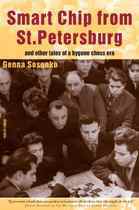Smart Chip From St.Petersburg
And Other Tales of a Bygone Chess Era
Genna Sosonko

The third in a fantastic series that examines famous chess players/personalities from the past (the first two are The Reliable Past and Russian Silhouettes), Smart Chip From St.Petersburg continues to share sometimes poignant and sometimes fascinating information about the lives of men and women that viewed chess as more food or oxygen than mere game.
In this volume, the cast of characters are:
Genrikh Chepukaitis (1935-2004):
“The 1958 Leningrad Blitz Championship was won by Viktor Kortchnoi. Second place was shared by Boris Spassky, Mark Taimanov and a first-category player who had beaten all the grandmasters in individual encounters. The name of this first-category player was Genrikh Chepukaitis, a modest master in classical chess but a true grandmaster in blitz.
“Once, in a discussion about the constantly shrinking amount of time allocated for thinking, Anatoly Karpov said that we might all end up playing blitz, and then Chepukaitis could become World Champion.
“Chepukaitis split with his wife in November 2003 hit him hard; they had been together for almost thirteen years. After the divorce and her departure overseas, he was back on his own in his small, neglected one-room flat. This dwelling was more like a bivouac, which he used only for sleeping, and once a week his ex-wifes sisters would stop by to do housework for the single man: some laundry, and they would fill up the empty fridge as he didnt buy anything for himself.
Imagine how a prime Chepukaitis would have done on the ICC, playing endless 3-minute games late into the night until he was forced to log off, dress, and trudge to work as the sun came up.
Yakov Neishtadt (at 80):
“When Neishtadt graduated from the Institute of Law in 1951 he didnt get a job immediately. Opening up his passport and seeing that he was Jewish, the head of the employment department gave it back, shaking his head.
A very strong player, eventually he became the editor of the famous magazine Chess in the USSR and chief editor of 64. His comment: “I thank fate for making this choice for me.
In 1992 Neishtadt and his family (which includes two Moscow born cats) moved to Israel. I find his love of animals moving and, I must admit, in my life I rarely befriend anyone who doesnt worship cats.
“Also in Moscow Yakov Isayevich would go out at night looking in the vacant lot near his home on Tishinskaya square, a place where stray cats and dogs would live, and treat the animals who awaited him to home-made delicacies.
Ludek Pachman: (1924-2003):
“Pachmans chess style was characterized by a sophisticated set-up in the opening, a wonderful knowledge of theory, pragmatism, belief in himself, and optimism. He won the Czechoslovak Championship on seven occasions, taking the title for the first time in 1946.
Like so many of that time, Pachman joined the communist party. Little did he guess that he would eventually become one of its biggest foes!
“The Prague Spring completely changed Pachmans views. After the occupation of his country by Warsaw Pact forces, he turned into a passionate, tireless, uncompromising campaigner against the new regime. In total he spent eighteen months in prison, which severely damaged him.
I remember the many articles in Chess Life magazine telling us about Pachmans fate. One tale that stuck in my young and impressionable mind was a report of him suffering a serious brain injury. The Soviets insisted that, while in prison, he had beaten his own head against the cell wall over and over.
“Ludek Pachman died in Passau, Germany on March 6, 2003. He was a witness to and a participant in events of the last century, which are difficult to compare to any others in world history. He knew many very famous people of the last sixty years of the century and he himself was, without doubt, the most noteworthy personality in the bright world of Czech chess.
Sosonko also discusses Evgeny Ruban (1941-1997), Ratmir Kholmov (1925-2006), Irina Levitina (Champion in chess and bridge), and J.H.Donner (1927-1988). As you can see from the brief snippets taken from the book, these tales tell us about each individuals chess adventures as well as other aspects of their lives and, in many cases, deaths. My own short comments show how I easily personalized each man the human condition is something we all share, and each person holds bits of ourselves in him.
Other Chapters: The Morpheus Variation (An article on the importance of sleep to chess professionals. This includes comments by Botvinnik, Spassky, and many others.), Killer Instinct Genna Adonis, The Stairway Of Life , and Two Against One (Chess and Religion).
Smart Chip From St.Petersburg is yet another masterpiece by Sosonko, and all three of his books should be owned by all true fans of chess.
